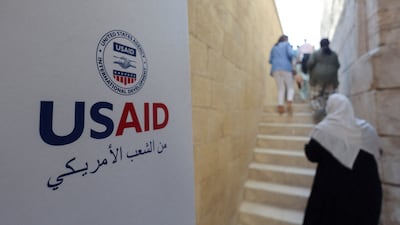Egypt's Higher Education Ministry has told local universities to cover costs for students on US-funded scholarships after President Donald Trump ordered a freeze on foreign aid.
The order suspends all foreign assistance, apart from humanitarian food programmes and military assistance to Israel and Egypt, for 90 days pending a review of US aid programmes.
The move will affect 1,077 Egyptian undergraduate students in public, private and non-profit universities who received scholarships from the US Agency for International Development (USAID), including 200 at the American University in Cairo (AUC), Higher Education Ministry spokesman Adel Abdel Ghaffar told The National.
Seven Egyptian graduate students studying in the US are also affected.
The US agency informed the scholarship recipients on Saturday that its programme was being suspended for 90 days, leading to panic and an outcry on social media.
In response, Egypt's Supreme Council of Universities, a state agency, held an emergency meeting led by Higher Education Minister Ayman Ashour on Tuesday night.
Mr Ashour announced that each university would commit to covering all tuition fees and support that USAID had been providing until the end of the second term.
His ministry said that the students would not be harmed and that universities would “fully cover the scholarships” whether they were for tuition fees or housing. It called on students and their parents not to be swayed by rumours and reassured them about their future.
Mr Abdel Ghaffar dismissed reports on social media that AUC students had been forcibly removed from their residences as “mere rumours”.
However, Mohamed Yousry, 24, a computer science student at the state-run Alexandria University who received a USAID scholarship to study at the prestigious and much more expensive AUC, told The National that he and many of his classmates had received an email on Saturday from university administrators saying that they would not be housed or allowed to attend classes there for 90 days or until further notice.
“We had to pack our things very quickly and organise our own transport to our home provinces. I returned to Alexandria, which wasn't very hard but some of my colleagues from Aswan and Upper Egypt had to make much longer journeys,” Mr Yousry said.
“I am finishing up my degree by June but there are students who have just started their scholarship programmes, so even if the universities cover the costs for the next 90 days, who knows if they will continue to do so if the US decides to defund these programmes.”
The suspension of US aid programmes stoked already seething anger towards Israel among Egypt’s youth, with many students seeing it as a move to pressure Egypt to allow in Palestinians displaced by the Gaza war.
Mr Trump on Saturday suggested that Jordan and Egypt could take in about 1.5 million Gazans left homeless by Israel's destructive military campaign in the enclave, either for the short-term or permanently. Both Jordan and Egypt quickly rejected the idea.
Egypt has been one of the largest recipients of US aid since the signing in 1978 of the Camp David Accords by Egyptian president Anwar Sadat and Israeli prime minister Menachem Begin under the guidance of US president Jimmy Carter.
The deal brought an end to more than 30 years of Egyptian-Israeli hostilities and helped the country’s passage into the neoliberal global economy.
As part of the agreement, the US committed to providing substantial economic and military aid to both Egypt and Israel. Since the signing of the peace treaty, Egypt has received US aid amounting to more than $30 billion, in addition to $1.3 billion in military aid annually. The assistance has been a key component of the US-Egypt relationship and is viewed as an important means of maintaining the stability of American interests in the region.


